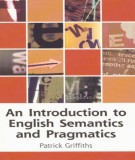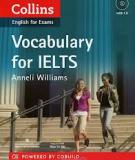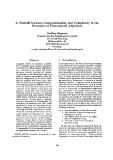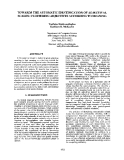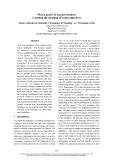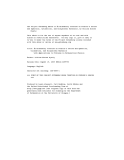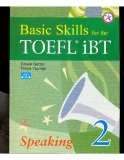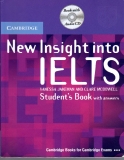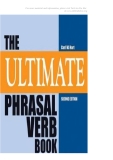
Adjective meanings
-
Ebook "English KnowHow 1: Student book" Offering contexts with international appeal, this title includes grammar presentations meant for the adult learner. It contains speaking and listening opportunities to develop communication skills, and reading and writing tasks to reflect on meaning and express one's own ideas. It also includes review units, and 'Know How' sections.
 144p
144p  luctumac0210
luctumac0210
 13-11-2023
13-11-2023
 13
13
 7
7
 Download
Download
-
The book has 60 two-page units. The left-hand page explains the phrasal verbs that are presented in the unit. You will usually find an explanation of the meaning of the phrasal verb, an example of it in use and, where appropriate, some comments on when and how it is used. The exercises on the right-hand page check that you have understood the information on the left-hand page and give you practice in using the material presented. Please refer to Ebook English phrasal verbs in use – Advanced (Second edition): Part 2 for more details.
 93p
93p  haojiubujain03
haojiubujain03
 09-08-2023
09-08-2023
 12
12
 7
7
 Download
Download
-
It was written to help you improve your knowledge of phrasal verbs in English. There are more than 5,000 phrasal verbs and related noun and adjective forms in use in English. This book focuses just on those phrasal verbs which you need to know for everyday spoken and written communication in English, and it aims to provide the information and practice which will help you understand and use them correctly. Please refer to Ebook English phrasal verbs in use – Intermediate (Second edition): Part 1 for more details.
 99p
99p  haojiubujain03
haojiubujain03
 09-08-2023
09-08-2023
 13
13
 6
6
 Download
Download
-
The book has 70 two-page units. The left-hand page explains the phrasal verbs that are presented in the unit. You will usually find an explanation of the meaning of each phrasal verb, an example of it in use and, where appropriate, any special notes about its usage. The right-hand page checks that you have understood the information on the left-hand page by giving you a series of exercises that practise the material just presented.
 103p
103p  haojiubujain03
haojiubujain03
 09-08-2023
09-08-2023
 11
11
 6
6
 Download
Download
-
This is about how English enables people who know the language to convey meanings. Semantics and pragmatics are the two main branches of the linguistic study of meaning. Both are named in the title of the book and they are going to be introduced here. This book is divided into 2 parts, the following is part 1 of the book. Inviting you to refer.
 105p
105p  nganga_09
nganga_09
 22-10-2015
22-10-2015
 121
121
 22
22
 Download
Download
-
Recognizing Listening adjectives from section 4 the endings, working out the meaning of words from listening context recognizing synonyms and collocations choosing the right part of speech, writing in an academic style reading.
 1p
1p  hohanhnhi
hohanhnhi
 13-01-2014
13-01-2014
 548
548
 143
143
 Download
Download
-
The words 'historic' and 'historical' are close in meaning, but their uses are quite different. Historic: The adjective 'historic' means 'having importance in history' or 'having influence on history'. Historical: The adjective 'historical' means 'having taken place in history', 'from the past' or 'pertaining to history'. Side-by-side examples:
 3p
3p  lathucuoicung123
lathucuoicung123
 26-09-2013
26-09-2013
 75
75
 7
7
 Download
Download
-
Linguistic access to uncertain quantitative knowledge about physical properties is provided by d i m e n s i o n a l adjectives, e.g. long-short in the spatial and temporal senses, near-far, fast-slow, etc. Semantic analyses of the dimensional adjectives differ on whether the meaning of the differential comparative (6 cm shorter than) and the equative with factor term (three times as long as) is a compositional function of the meanings the difference and factor terms (6 cm and three times) and the meanings of the simple comparative and equative, respectively.
 10p
10p  buncha_1
buncha_1
 08-05-2013
08-05-2013
 56
56
 2
2
 Download
Download
-
In this paper we present a method to group adjectives according to their meaning, as a first step towards the automatic identification of adjectival scales. We discuss the properties of adjectival scales and of groups of semantically related adjectives and how they imply sources of linguistic knowledge in text corpora. We describe how our system exploits this linguistic knowledge to compute a measure of similarity between two adjectives, using statistical techniques and without having access to any semantic information about the adjectives. ...
 11p
11p  bunmoc_1
bunmoc_1
 20-04-2013
20-04-2013
 56
56
 1
1
 Download
Download
-
Texts and dialogues often express information indirectly. For instance, speakers’ answers to yes/no questions do not always straightforwardly convey a ‘yes’ or ‘no’ answer. The intended reply is clear in some cases (Was it good? It was great!) but uncertain in others (Was it acceptable? It was unprecedented.). In this paper, we present methods for interpreting the answers to questions like these which involve scalar modifiers.
 10p
10p  hongdo_1
hongdo_1
 12-04-2013
12-04-2013
 46
46
 1
1
 Download
Download
-
The apparent plural form in English, like the French plural form les mathématiques (and the less commonly used singular derivative la mathématique), goes back to the Latin neuter plural mathematica (Cicero), based on the Greek plural τα μαθηματικά (ta mathēmatiká), used by Aristotle (384–322 BC), and meaning roughly "all things mathematical"; although it is plausible that English borrowed only the adjective mathematic(al) and formed the noun mathematics anew, after the pattern of physics and metaphysics, which were inherited from the Greek.
 309p
309p  ngoctu2393
ngoctu2393
 28-11-2012
28-11-2012
 57
57
 4
4
 Download
Download
-
The word mathematics comes from the Greek μάθημα (máthēma), which, in the ancient Greek language, means "what one learns", "what one gets to know", hence also "study" and "science", and in modern Greek just "lesson". The word máthēma is derived from μανθάνω (manthano), while the modern Greek equivalent is μαθαίνω (mathaino), both of which mean "to learn". In Greece, the word for "mathematics" came to have the narrower and more technical meaning "mathematical study", even in Classical times.
 85p
85p  ngoctu2393
ngoctu2393
 28-11-2012
28-11-2012
 54
54
 7
7
 Download
Download
-
Rearrange the words in bold and write them in the grid on the right. The first letter of each word has been underlined. When you have finished, you will find another word which means 'to make a building like new again' in the shaded vertical strip. Read the descriptions 1 - 14 and decide which type of accommodation is being described in each one. Use your dictionary to look up the meanings of the adjectives in bold.
 75p
75p  contentnew1
contentnew1
 17-05-2012
17-05-2012
 273
273
 122
122
 Download
Download
-
A lot of verbs and adjectives can be made into opposites by adding a prefix (e.g., agree - disagree, correct - incorrect). However, in other cases, it is necessary to change some letters or use a completely different word in order to make an opposite. Some verbs and adjectives can have more than one meaning, and so can have more than one opposite.
 149p
149p  contentnew1
contentnew1
 17-05-2012
17-05-2012
 374
374
 228
228
 Download
Download
-
So far you have learnt how to record transactions in the accounting books by means of debit and credit entries. At the end of each accounting period the figures in each account are examined in order to summarise the situation they present. This will often, but not always, be a year if you are calculating profit. It will be at least once a month if you want to see what is happening with respect to particular accounts. Probably the most obvious reason for this is to find out how much our customers owe us for goods we have sold to them. In most businesses this...
 35p
35p  contentnew1
contentnew1
 11-05-2012
11-05-2012
 304
304
 94
94
 Download
Download
-
Grammar: - Unit 1: The present simple, the past simple, adverbs of frequency. - Unit 2: Wh - questions, gerund and to + Infinitive. - Unit 3: Past Perfect. - Unit 4: The + Adjective, used to + infinitive, which as a connector - Unit 5: Present perfect and the present Perfect passive, who, which, that. - Unit 6: The present progressive (with future meaning), be going to. - Unit 7: Because of and In spite of.
 12p
12p  hhhuuunnnggg
hhhuuunnnggg
 05-11-2011
05-11-2011
 662
662
 224
224
 Download
Download
-
The inspiration for The Ultimate Phrasal Verb Book came about when a student asked me for a textbook to help her learn the meanings of common phrasal verbs. I had nothing to offer. The only textbook focusing on common verbs that I could give her contains not one phrasal verb — it teaches arise but not get up, awake but not wake up, seek but not look for. differentiation is made between recognized adjectives derived from past participles and past participles with adjectival meaning.
 437p
437p  huongduong504
huongduong504
 31-05-2011
31-05-2011
 492
492
 225
225
 Download
Download
-
21 (6)(a) (b) They can stay/leave/hide/die/starve/cry [verb] *They can gorgeous [adjective]/happily [adverb]/down [preposition]/door [noun] And the only category of word which can occur after very (in the sense of extremely) is an adjective or adverb, as we see from (7) below: (7)(a) (c) (e) He is very slow [very+adjective] (b) He walks very slowly [very+adverb] *Very fools waste time [very+noun] (d) *He very adores her [very+verb] *It happened very after the party [very+preposition] (But note that very can only be used to modify adjectives/adverbs which by virtue of their meaning are gra...
 10p
10p  hanhphuc51
hanhphuc51
 20-12-2010
20-12-2010
 99
99
 13
13
 Download
Download
-
Regarding a means for achieving an end. In the early Indian Wars, since the U.S. Cavalry had repeating rifles and the Native Americans had only bows and arrows, the soldiers had a distinct tactical advantage. tactic (noun). tangential (adjective) Touching lightly; only slightly connected or related.
 10p
10p  anhheomap
anhheomap
 13-12-2010
13-12-2010
 74
74
 9
9
 Download
Download
-
3 Ecosystems have ontic openness 3.1 INTRODUCTION This chapter’s title may mean little to many persons, yet the essence may be understood fairly easily on an intuitive basis. The adjective “ontic”, which hardly appears in any dictionary, clearly relates to the term ontology, which is used in philosophy in its widest sense
 24p
24p  summerflora
summerflora
 27-10-2010
27-10-2010
 71
71
 6
6
 Download
Download
CHỦ ĐỀ BẠN MUỐN TÌM













